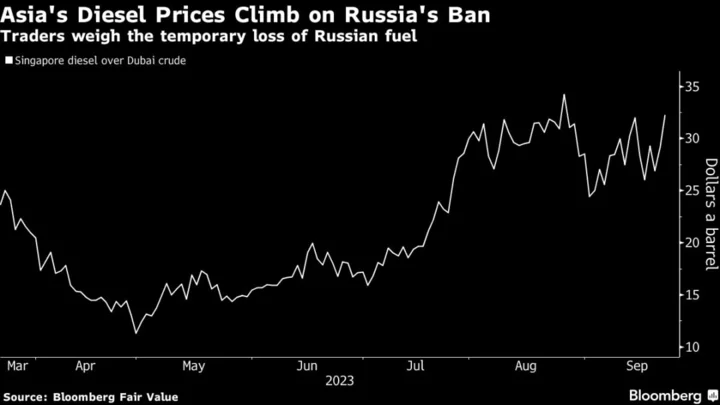Asian diesel prices climbed after Russia’s surprise export ban, even as a host of market watchers said the curb would soon be lifted.
The prohibition — which took effect from Thursday with some near-term exceptions — looks set to exacerbate existing tightness in global fuels markets, with demand set to rise in the winter months just as many of the world’s refiners have little means to ramp up production any further. In Asia, there’s the added complication that China’s aviation recovery is also gaining pace, lifting the consumption of jet fuel — a product with similar properties to diesel.
The export curb imposed by Moscow is the latest jolt suffered by energy markets since Russia’s invasion of Ukraine in 2022 upended worldwide crude and product flows. Diesel is a mainstay product for the global economy, powering trucks, ships and trains, and so far this year, Russia’s been the world’s biggest seaborne shipper, according to data from Vortexa Ltd.
“Much will depend on how long Russia keeps the fuel-export ban in place,” Commonwealth Bank of Australia analyst Vivek Dhar said, noting its exemptions. “The immediate impact will be dampened by Russia allowing fuel cargoes to be exported if they were already accepted for shipment by Russian Railways, or have loading papers for seaborne transportation.”
Processors in China and India have been exporting more diesel to international buyers as the two refining giants take record amounts of Russian, as well as Iranian, crude. In addition, Asia is also not among the main buyers of Russian diesel and gasoline, and thus will not be the most severely hit by the ban.
On Friday, prices of diesel over Dubai crude in Singapore — a proxy for profits from making the fuel — rose 3.4% to $30.21 a barrel. That remains well below August’s closing peak above $34 a barrel, which was the most since January.
Storage Concerns
While Russia hasn’t given a time line for how long the ban on diesel exports — as well as a complementary one for gasoline shipments — will be in place, there are widespread expectations it’ll be brief.
“Once domestic supplies are replenished, Russia will have to resume exports due to a lack of spare storage capacity,” industry consultant FGE said in a note. At the latest, Russian diesel exports are expected to resume in two weeks, possibly earlier, the company said.
There was a similar outlook from JP Morgan Chase & Co. Russia’s ban will last only a “couple of weeks, until harvest concludes in October,” analysts including Natasha Kaneva and Prateek Kedia wrote. Still Citigroup Inc.’s assessment was for a longer duration, with the ban lasting about six weeks.
To be sure, Russian diesel has been redirected to markets such as Turkey, Latin America, and even the Middle East since an earlier Group of Seven ban on Russian fuels came into force. While a loss of Russian flows won’t be felt immediately in Asia as the region is home to a substantial refining industry, it could serve to tighten an already volatile global diesel market.
At the same time, there are also concerns over China’s ability to export much more than current levels, which are already above-normal. Local refiners have ramped up their processing in recent months due to strong profits from making fuels, and also from exports, although the country’s fuel outflows are controlled by government-set quotas, rather than free-market forces.
--With assistance from Serene Cheong.
(Updates to add Citigroup’s outlook in ninth paragraph)

